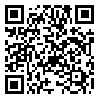Volume 36, Issue 143 (September 2023)
IJN 2023, 36(143): 314-329 |
Back to browse issues page
Download citation:
BibTeX | RIS | EndNote | Medlars | ProCite | Reference Manager | RefWorks
Send citation to:



BibTeX | RIS | EndNote | Medlars | ProCite | Reference Manager | RefWorks
Send citation to:
Seyedfatemi N, Khaleqparast S, Fatemi M, Haghani S. The Relationship Between Circadian Rhythm and Temperament/Character of Nurses. IJN 2023; 36 (143) :314-329
URL: http://ijn.iums.ac.ir/article-1-3611-en.html
URL: http://ijn.iums.ac.ir/article-1-3611-en.html
1- Department of Psychiatric Nursing , Nursing and Midwifery Care Research Center, Iran University of Medical Sciences, Tehran, Iran.
2- Heart Research Center, Shahid Rajaei Cardiovascular Research and Treatment Center Tehran, Iran.
3- Department of Psychiatric Nursing, School of Nursing and Midwifery, Iran University of Medical Sciences, Tehran, Iran. ,mojganfatemi@yahoo.com
4- Department of Biostatistics, Nursing and Midwifery Care Research Center, Iran University of Medical Sciences, Tehran, Iran.
2- Heart Research Center, Shahid Rajaei Cardiovascular Research and Treatment Center Tehran, Iran.
3- Department of Psychiatric Nursing, School of Nursing and Midwifery, Iran University of Medical Sciences, Tehran, Iran. ,
4- Department of Biostatistics, Nursing and Midwifery Care Research Center, Iran University of Medical Sciences, Tehran, Iran.
Abstract: (3254 Views)
Background & Aims One of the areas that need attention in the nursing profession, which can affect various fields of work, professional, care, etc., are temperament and character. Various factors can affect the temperament and character. One of these factors is the circadian rhythms in which most nurses experience disturbances. Considering the importance of examining and evaluating temperament and character in nurses and the effects of circadian rhythm disturbances on them, and given that less attention has been paid to it, this study aims to determine the relationship between circadian rhythm and temperament/character of nurses working in selected teaching hospitals in Tehran, Iran.
Materials & Methods This is a descriptive-correlational study with a cross-sectional design. The study population consists of all nurses working in teaching hospitals affiliated to Iran University of Medical Sciences. The study samples were 200 eligible nurses who were selected randomly (by lottery method) from different departments of four hospitals. A demographic form, the morningness-eveningness questionnaire (MEQ), and Cloninger’s temperament and character inventory (TCI) were used to collect data. Data analysis was conducted in SPSS software, version 16.
Results Most of the participants (64%) were neither-type nurses in terms of circadian rhythm. The circadian rhythm in overall had a negative significant correlation with persistence (P=0.039) and self-transcendence (P=0.047). Also, circadian rhythm had a significant relationship with age (P<0.001), sex (P=0.044), employment status (P=0.003), and work experience P<0.001). The dimensions of TCI, including novelty seeking, reward dependence, persistence, self-directedness, cooperativeness, and self-transcendence, had a statistically significant relationship with the demographic characteristics of nurses.
Conclusion The circadian rhythm of nurses has a significant negative correlation with some components of TCI. Considering the impact of circadian rhythm on the quality of nursing care, the officials and hospital managers should gain sufficient knowledge of circadian rhythms, identify evening-type nurses, provide training, facilities, and special privileges to nurses, and determine their work shifts according to their circadian rhythms, so that they can improve the quality of patient care and increase patient satisfaction.
Materials & Methods This is a descriptive-correlational study with a cross-sectional design. The study population consists of all nurses working in teaching hospitals affiliated to Iran University of Medical Sciences. The study samples were 200 eligible nurses who were selected randomly (by lottery method) from different departments of four hospitals. A demographic form, the morningness-eveningness questionnaire (MEQ), and Cloninger’s temperament and character inventory (TCI) were used to collect data. Data analysis was conducted in SPSS software, version 16.
Results Most of the participants (64%) were neither-type nurses in terms of circadian rhythm. The circadian rhythm in overall had a negative significant correlation with persistence (P=0.039) and self-transcendence (P=0.047). Also, circadian rhythm had a significant relationship with age (P<0.001), sex (P=0.044), employment status (P=0.003), and work experience P<0.001). The dimensions of TCI, including novelty seeking, reward dependence, persistence, self-directedness, cooperativeness, and self-transcendence, had a statistically significant relationship with the demographic characteristics of nurses.
Conclusion The circadian rhythm of nurses has a significant negative correlation with some components of TCI. Considering the impact of circadian rhythm on the quality of nursing care, the officials and hospital managers should gain sufficient knowledge of circadian rhythms, identify evening-type nurses, provide training, facilities, and special privileges to nurses, and determine their work shifts according to their circadian rhythms, so that they can improve the quality of patient care and increase patient satisfaction.
Type of Study: Research |
Subject:
nursing
Received: 2022/09/3 | Accepted: 2023/08/23 | Published: 2023/09/1
Received: 2022/09/3 | Accepted: 2023/08/23 | Published: 2023/09/1
Send email to the article author
| Rights and permissions | |
 |
This work is licensed under a Creative Commons Attribution-NonCommercial 4.0 International License. |







